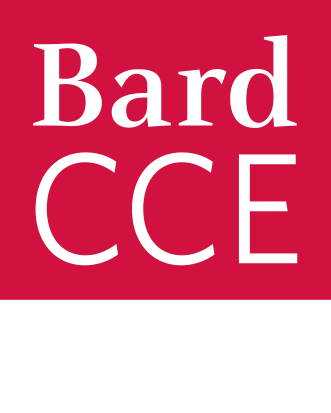Voting is one of the most fundamental rights in a democratic society. We encourage all students to exercise their right to vote. Election@Bard is a student-led initiative that helps students register to vote, provides information about candidates, hosts forums in which candidates and students can meet, and protects the rights of students to vote and have their votes counted. Since 2014, Election@Bard has fought for Bardians' right to vote under the leadership of undergraduate students selected by the Center for Civic Engagement and the Andrew Goodman Foundation.
Learn about the history of voting rights on college campuses in the book Youth Voting Rights: Civil Rights, the Twenty-Sixth Amendment, and the Fight for American Democracy on College Campuses.
Voting on Bard Campus
Register to Vote
As a college student, you can either vote on campus or in your hometown. Whichever you decide to do, Election@Bard is here to help you out.
Vote by Mail
Voting by mail is a great option if you choose to stay registered in your home-town or don't feel comfortable voting in person this year.
Get Involved
Volunteer at the polling places, staff Election@Bard tables around campus, or work directly with local officials.
History of Voting at Bard
Voter suppression of college students in Dutchess County was rampant until 1999, when Bard and Vassar students—with the support of both institutions—threatened a lawsuit against the Dutchess County Board of Elections. The fight for student's voting right that ensued helped inspire change to New York Election Law, which now mandates that qualifying colleges and universities set up on-campus polling locations across the State of New York.
Leadership
Meet the students who lead Election@Bard and help drive voter engagement on Bard College campus forward.
Contact Us
Have questions, concerns, or just want to chat? Send us an email or stop by during our office hours!
Register to Vote
Here's how you can get started:
-
On-Campus Students
- Sample New York State Voter Reg Form.
- New York State Voter Registration Form that includes the Bard address.
- Print it.
- Sign it in blue or black ink.
- Deliver to the Bard Center for Civic Engagement. We'll take care of sending it off for you.
-
Off-Campus Students – Local Area
- Sample New York State Voter Reg Form.
- Fill out the New York State Voter Registration Form.
- Print it.
- Sign it in blue or black ink.
- Deliver to the Bard Center for Civic Engagement. We'll take care of sending it off for you.
-
Registering at HomeWhether you live on or off-campus, you can choose to remain registered in your home town or city.
- Register to Vote Here.
- If your state allows you to submit your registration electronically, do so! If not, print out your form.
- Sign in blue or black ink.
- Deliver to the Bard Center for Civic Engagement. We'll take care of sending it off for you.
Vote by Mail
Voting by mail is a great option if you choose to stay registered in your home-town or don't feel comfortable voting in person this year.
-
Getting Started
- Make sure you are registered to vote. Check your registration status
- If it says you aren't registered that may be because you registered recently. The database takes some time to update. If you have never registered before click here.
- If you are already registered to vote you can request your absentee ballot. Follow the instructions below.
New York State Voters
- Absentee Ballot Requests here
- Sample New York Absentee Ballot Request
- How to fill out your Absentee Ballot Request
- New York State Absentee Ballot Request here
- Print out your request form
- Sign in blue or black ink
- Deliver to the Bard Center for Civic Engagement. We'll take care of sending it off for you.
Out-of-State Voters
- Request your absentee ballot here
- If your form can be submitted electronically do so. If not, print it out and deliver it to the CCE Gatehouse.
Get Involved
-
With Election@BardCome help table with Election@Bard at one of their voter registration drives or even on Election Day! You must attend one of our volunteer training sessions in order to table, but we are always happy to have help! Reach out to us at [email protected] for more information.
-
With Democratic Candidates
- Dan Aymar-Blair, Candidate for Dutchess County Comptroller
- Kara Gerry, Candidate for Dutchess County Court Judge
- Kristofer Munn, Candidate for Dutchess County Legislator, District 20
- Kristina Doucharm, Candidate for Red Hook Town Board
- Ken Migliorelli, Candidate for Red Hook Town Board
-
With Republican Candidates
- Will Truitt, Candidate for Dutchess County Comptroller
- Judge Ned McLoughlin, Candidate for County Court Judge
- Judge Tracy MacKenzie, Candidate for Dutchess County Family Court Judge
The History of Voting Rights at Bard
-
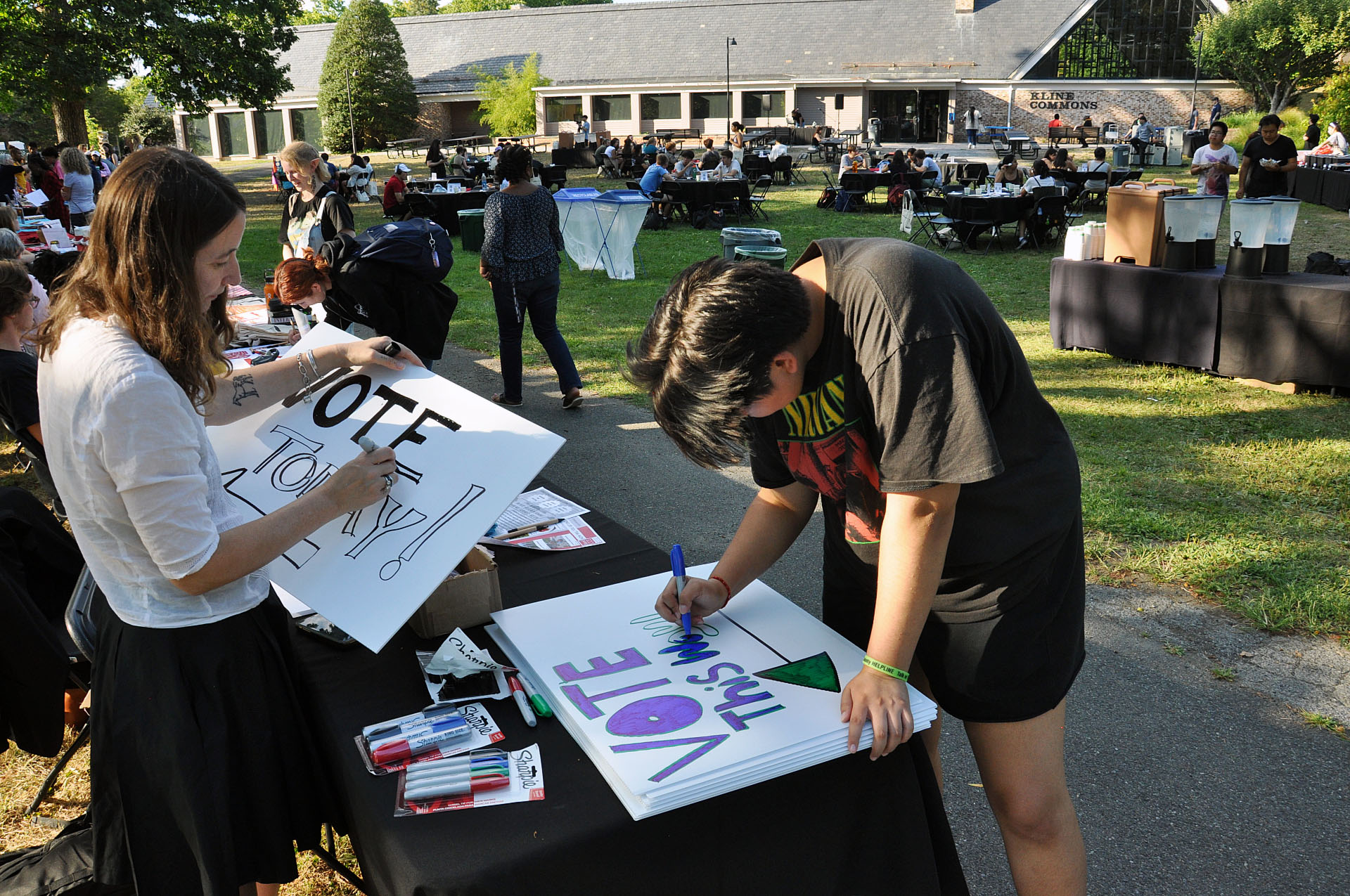 Photo by Jonathan Asiedu ’24.
Photo by Jonathan Asiedu ’24. -
Bard students, faculty, and staff have worked to secure equal access to the ballot for more than two decades. Read about the court decisions, watch videos, and understand more about the history of campus election advocacy.
Read the Full History
Follow us on Instagram
Follow @electionatbard to stay up to date on our events and pop-ups!
Questions?
Election@Bard Student Leadership
-
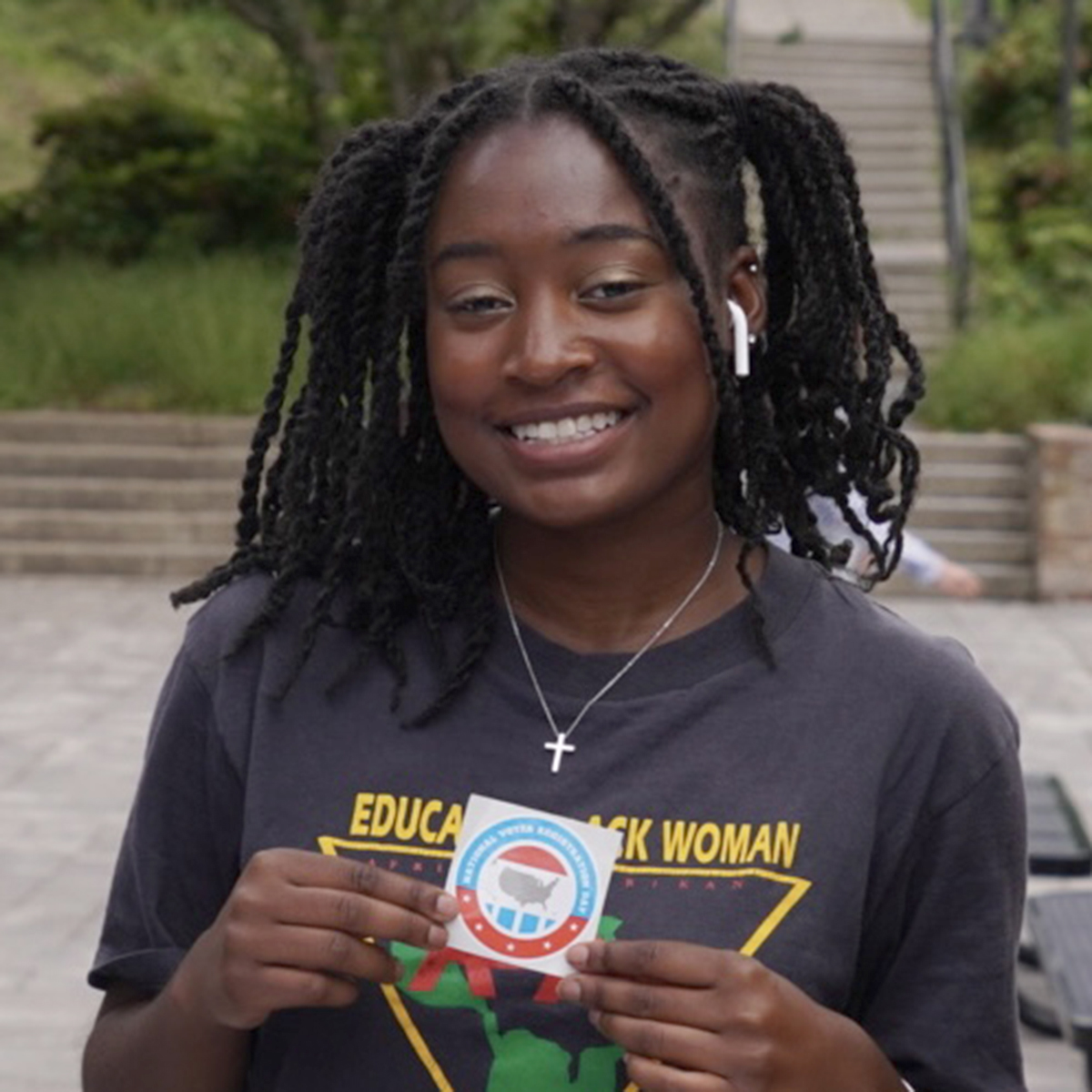 Sierra Ford'26Lead Campus Initiatives Intern
Sierra Ford'26Lead Campus Initiatives InternSierra Ford'26

Sierra is majoring in Political Studies and Sociology in the hopes that she can use her education to continue to continue the work around educating today’s youth on the most relevant and pressing political issues. Through her work with Election@Bard, she is fulfilling both a personal mission and a societal necessity as she works with the Election@Bard Intern team to find ways to increase youth representation in the American electorate. Sierra looks forward to bridging the gap between young collegiate voters and the American electoral process. -
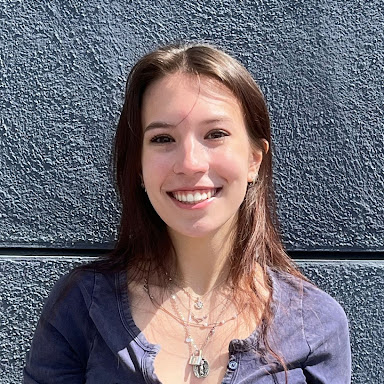 Ella Walko'26Co-Lead Campus Initiatives Intern
Ella Walko'26Co-Lead Campus Initiatives InternElla Walko'26

Ella is currently majoring in Politics and hoping to pursue law school after graduation. She has long been committed to young people making their voices heard, and is excited to continue working towards increased voter education and participation on college campuses. Through her work at Election@Bard, she has successfully combined her academic interests with her personal commitment to democratic participation, working with the rest of the team to build engagement and civic community on Bard’s campus and beyond. -
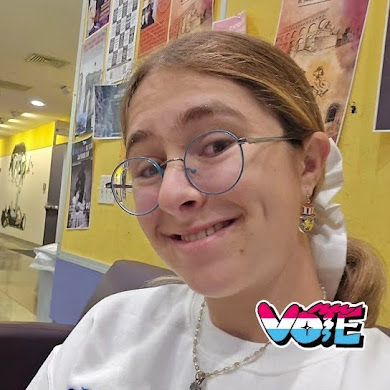 Yale Coopersmith'26Campus Initiatives Intern
Yale Coopersmith'26Campus Initiatives InternYale Coopersmith'26

Yale is a Written Arts major (and earning her Certificate of Civic Engagement) who is dedicated to helping people understand the power of their voices and their vote. During her time with Election@Bard, Yale has worked to be a friendly face students can turn to for any question they need answered about the voting process, or politics in general. She believes that everyone deserves a place at the table of the American political process, and hopes that her work with Election@Bard will inform and inspire her peers to take an active role in the shaping of our democracy. -
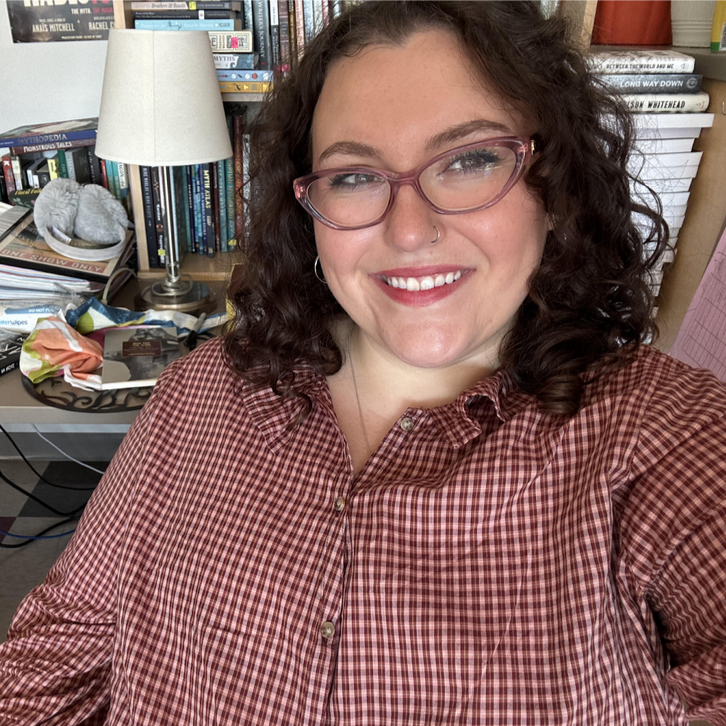 Fiona Flynn, MAT ‘26Campus Initiatives Intern
Fiona Flynn, MAT ‘26Campus Initiatives InternFiona Flynn, MAT ‘26

Fiona graduated from Bard in May of 2025 with a degree in French and Written Arts, but has stayed to complete a Masters of Arts in Teaching, specializing in ELA. She has worked for Election@Bard since her junior year, but has always been passionate about civic engagement, a passion sparked by her town councilwoman mother in her childhood. Fiona loves to learn from her work with the Bard community, as well as from her fellow team members every day. -
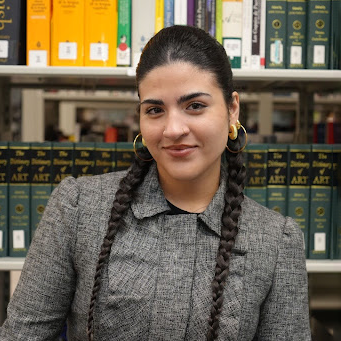 Malena Perez Diaz'27Campus Initiatives Intern
Malena Perez Diaz'27Campus Initiatives InternMalena Perez Diaz'27

Malena is majoring in Art History & Visual Culture with a second focus in Anthropology with intentions of continuing her studies in Art Conservation and Restoration. Through her creative pursuits, she strives to use art as an outlet for political literacy, exposure and accessibility in the youth. In her third year with Election@Bard, she’s excited to continue fostering the use of art in political education.
Election News
Article by Jonathan Becker, Erin Cannan, and Yael Bromberg Featured in Times Higher Education
The article calls on institutions of higher education to develop integrated plans to promote student voting.
Article by Jonathan Becker, Erin Cannan, and Yael Bromberg Featured in Times Higher Education
Post Date: 12-10-2025
Bard College Student Sierra Ford ’26 Featured in the Stennis Center's Public Service Review
Ford’s article, “Bard College's Battle for the Ballot Box: A Story of an Institution's Pursuit for Democracy,” details the history of student voter participation at the College, where she currently leads Election@Bard.
Bard College Student Sierra Ford ’26 Featured in the Stennis Center's Public Service Review
Bard student Sierra Ford ’26 has been featured in the latest Public Service Review, a publication run by the Stennis Center for Public Service, a federal agency which provides leadership training to young people interested in careers in public service. Ford’s article, “Bard College's Battle for the Ballot Box: A Story of an Institution's Pursuit for Democracy,” details the history of student voter participation at the College, where she currently leads Election@Bard and works to increase voter turnout and support a campus culture rooted in civic engagement. “I have always been struck by my institution’s willingness to take on daunting legal processes for the protection of student voting rights,” Ford writes in the Review. She has also collaborated with New York legislators and voting coalitions to advance policies that protect young voters. After graduation, Sierra plans to continue advancing youth civic participation and public policy, with a focus on expanding democratic access for marginalized communities.Post Date: 12-09-2025
More News
-
Jonathan Becker’s New Book on Youth Voting Rights Featured in Multiple Publications
Jonathan Becker’s New Book on Youth Voting Rights Featured in Multiple Publications
Jonathan Becker, vice president for Academic Affairs and director of the Center for Civic Engagement at Bard College, has recently published articles and received coverage in multiple media outlets about his new book, Youth Voting Rights: Civil Rights, the Twenty-Sixth Amendment, and the Fight for American Democracy on College Campuses. The book, coedited by Becker and constitutional rights attorney Yael Bromberg, uses the history of the 26th Amendment and the ongoing fight to promote and defend youth voting rights as a prism through which to teach the history of the struggle for the fundamental right to vote in the United States. The book focuses on case studies of four institutions —Tuskegee University, Prairie View A&M University, North Carolina A&T State University, and Bard College—which offer unique insights into the role of college communities in the fight for suffrage, and their contributions to the evolution of the right to vote.Jonathan Becker, vice president for Academic Affairs and director of the Center for Civic Engagement at Bard.
On November 18 at 5 pm, Upstate Films at the Starr Theater in Rhinebeck is hosting a special multi-media presentation of the book. Free tickets here.
WAMC’s Roundtable: Jonathan Becker's new book is Youth Voting Rights: Civil Rights, the Twenty-Sixth Amendment, and the Fight for American Democracy on College Campuses
Inside Higher Ed: 4 Times Colleges Led the Fight for Voting Rights
Talking Points Memo: Inside the GOP’s Assault on Youth Voting Rights
The Nation: The Fight for American Democracy on College Campuses
Post Date: 11-18-2025
-
Ella Walko ’26 Recognized for Voter Registration, Education, and Turnout Efforts
Ella Walko ’26 Recognized for Voter Registration, Education, and Turnout Efforts
Ella Walko ’26.Walko ’26 Is One of 232 College Students Nationwide Recognized for Their Nonpartisan Voter Registration and Turnout Successes in 2024
Bard College and the ALL IN Campus Democracy Challenge (ALL IN) honored Ella Walko ’26 as part of the fourth annual ALL IN Student Voting Honor Roll. The 2025 ALL IN Student Voting Honor Roll recognizes college students at participating campuses who have gone above and beyond to advance nonpartisan student voter registration, education and turnout efforts in their communities. Ella Walko ’26 is one of 232 students who mobilized their fellow students to make their voices heard in a historic election cycle. At Bard, Walko is majoring in politics with a concentration in gender and sexuality studies. She is actively involved with Election@Bard, a student-led initiative that helps students register to vote, provides information about candidates, hosts forums in which candidates and students can meet, and protects the rights of students to vote and have their votes counted.
“The Bard Center for Civic Engagement chose to honor Ella on the All-In Student Honor Roll because she exemplifies all of the best qualities of a Bard student,” said Sarah deVeer ’17, Bard CCE Outreach Coordinator Special Events Administrator. “Ella is a dynamic and consistently hardworking leader, who has risen to meet the needs of her generation through her work on the Election@Bard team. Ella is one of the most communicative, intentional, and collaborative forces of a student that I have had the pleasure of working with. We look forward to seeing where Ella's post-Bard journey takes her.”
“I am honored to receive this award, but what is even more gratifying is working alongside my peers and team members to build an informed, engaged, and civically active community,” said Walko. “I’m so proud of our efforts this past year and all we’ve been able to accomplish!”
“Whether they hosted nonpartisan voter registration drives or early voting celebrations, the students honored today made sure their peers did not sleep in on Election Day,” said Jen Domagal-Goldman, Executive Director of the ALL IN Campus Democracy Challenge. “With 100,000 local elections happening across the country in 2025, ALL IN students continue to ensure that everyone on their campuses has the information they need to cast their ballot. The 232 Student Voting Honor Roll honorees lead by example, making nonpartisan voter participation a lifelong habit for themselves and their peers.”
A recent survey from CIRCLE found that 48% of under-35 youth who did not vote in 2024 heard little or nothing at all about how to vote, compared to the 15% of under-35 youth who cast their ballots. By integrating nonpartisan voter registration and education into campus life, colleges and universities can have a measurable impact in encouraging students to become active and engaged citizens.
The ALL IN Campus Democracy Challenge empowers colleges and universities to achieve excellence in nonpartisan student civic engagement. With the support of the ALL IN staff, campuses that join the ALL IN Campus Democracy Challenge complete a set of action items to institutionalize nonpartisan civic learning, voter participation and ongoing engagement in our democracy on their campus. The ALL IN Campus Democracy Challenge engages more than 1,000 institutions enrolling over 10 million students in all 50 states and the District of Columbia. Campuses can join ALL IN here.
Post Date: 04-10-2025
-
Pavlina Tcherneva Writes Levy Policy Note on Election Outcome
Pavlina Tcherneva Writes Levy Policy Note on Election Outcome
Pavlina Tcherneva, president of the Levy Economics Institute at Bard College, professor of economics, and director of OSUN’s Economic Democracy Initiative, posted a policy note on the outcome of the US presidential election and how many Americans voted for progressive policies, such as state ballot measures to increase minimum wage and require paid sick leave, despite Donald Trump having won the presidential bid. She addresses how numerous issues, including economic concerns, wages, immigration policy, and reproductive health rights, among many other factors, affected the way voters responded, particularly in states that voted Republican. “All polls—whatever one’s feelings about their reliability—kept pointing to the same defining issue in this (as in every other) election: the economy,” writes Tcherneva. “Critical issues of democracy, abortion, and immigration filled the airwaves and political speeches, but the economy remained once again more powerful than any one of them.”Pavlina Tcherneva.
Post Date: 11-12-2024
-
Election Day on Bard’s Campus Featured in Inside Higher Ed
Election Day on Bard’s Campus Featured in Inside Higher Ed
Bard College, now in its fifth year of having a consistent polling site on its Annandale campus, was featured in Inside Higher Ed (IHE) in a report about how campuses and faculty across the country are handling classes on Election Day. At least 86 colleges and universities have canceled classes to facilitate voting, according to Day on Democracy, an organization that helps students advocate for their institutions to give them Election Day off, IHE reports. Today, a group of professors at Bard are opening their classrooms for discussions about the importance of democracy, and are joining attendees for a walk to the campus polling site to support those who are voting. “Many faculty members see a fundamental link between higher education and democracy, that it’s a fundamental pillar of liberal education in the United States,” said Jonathan Becker, executive vice president of Bard College and director of the Center for Civic Engagement. “What more important act for an educator is [there than] to speak about the most fundamental democratic rights, which is the right to vote?”Election@Bard, November 2023. Photo by Jonathan Asiedu ’24
Post Date: 11-05-2024
-
A Poll to Call Our Own: The Bard Voting Story, New Short Film Premieres on November 4 at Bard College
A Poll to Call Our Own: The Bard Voting Story, New Short Film Premieres on November 4 at Bard College
On Monday, November 4, at 5 pm, Bard College will host a screening and discussion for the public premiere of the Open Society University Network’s (OSUN) documentary film, A Poll to Call Our Own: The Bard Voting Story. The screening will be followed by a discussion with key actors, including Bard alumni/ae Sarah deVeer ’17, Jonian Rafti ’15, Seamus Heady ’22 (producer/director), lawyer Yael Bromberg, Bard Vice President for Civic Engagement Erin Cannan, and Bard Vice President for Academic Affairs Jonathan Becker. The event will take place at the Weis Cinema in the Bertelsmann Campus Center. It will also be broadcast as a webinar. Register in advance for this webinar here.Still from A Poll to Call Our Own: The Bard Voting Story. Courtesy of Seamus Heady ’22
The short film A Poll to Call Our Own: The Bard Voting Story chronicles the quarter-century fight at Bard over student voting rights, a period during which Bard students and administrators, with the support of groups like the Andrew Goodman Foundation and the New York Civil Liberties Union, won four lawsuits—three state and one federal—to protect students’ right to vote locally and to secure a polling place on the Bard campus. Bard’s experience helped inspire New York State to pass a law in 2022 mandating polling places at or near college campuses that have 300 or more registered on-campus voters.
The film was produced as an open educational resource for the course, Student Voting: Power, Politics and Race in the Fight for American Democracy. The course, which is supported by the Andrew W. Mellon Foundation and OSUN, is collaboratively taught by faculty from Bard, North Carolina Agricultural and Technical State University (North Carolina A&T), Prairie View A&M University, and Tuskegee University. Students meet virtually weekly to discuss issues in the course, including case studies which explore histories of student voting at each institution. By the end of the project, there will be a film and written case study for each campus, chronicling their fight for student voting rights.
A Poll to Call Our Own: The Bard Voting Story contains interviews with key players in the fight for a polling place, including current and former students, key administrators, and legal counsel, as well as archival footage of students being harassed at a local poll site and speaking before the Red Hook Town Board about the need for a polling place on campus. It is accompanied by a written case study.
Director and producer Seamus Heady ’22 said: “Our film reveals the powers which have worked, often quietly, to stand between youth voters and the polls. Nobody goes out of their way to silence meaningless voices. It is my hope that youth everywhere, who may feel dubious about the power of their votes, take this film as an affirmation of the significant role they play in our democracy. Bard as an institution has committed significant resources to bring attention to local municipal injustice, which could otherwise go unnoticed. I believe all universities owe it to their students to do the same.”
Bard College President Leon Botstein, who was a litigant in two of the cases, said: “This film illustrates Bard’s belief in the inextricable link between education and democracy. I am proud to have served as a litigant with Bard students and administrators in our successful campaign to secure a polling place on campus and to advocate for a law mandating polling places on college campuses in New York State with 300 or more registered voters. As trust in institutions and faith in democracy wanes in the United States, particularly amongst American youth, it is more important now than ever to fight for justice and change through securing for all citizens the right to vote.”
Bard’s Vice President for Academic Affairs, Director of Bard’s Center for Civic Engagement, and Professor of Political Studies Jonathan Becker said: “The film covers many of the critical milestones of Bard’s long fight over student voting rights. It effectively captures how successive generations of Bard students mobilized with the support of the Bard administration and partnered with organizations like the Andrew Goodman Foundation and the New York Civil Liberties Union to fight for their democratic rights. It is a testament to the capacity of higher education institutions to serve as civic actors in an America whose democracy is increasingly under threat.”
Bard student Sierra Ford ’26, who is the head of Election@Bard and an Andrew Goodman Ambassador, said: “It is incredible to be a part of a legacy of rich voter advocacy at Bard. What a privilege it has been to join my peers, administration, and mentors in realizing an electorally engaged community.”
Bard Vice President for Civic Engagement Erin Cannan said: “The Bard student voting story is a reminder to all of us that fair elections require vigilance and engagement of young people. And that the fear of ‘over enfranchising’ students cannot be a reason for election officials to act illegally. This work is never finished.”
Assistant Producer at OSUN Maria Pankova said: “Working on this case study was an opportunity for me to learn more about Bard College’s history and the culture of civic engagement on campus. As a Bard graduate, I felt closer to my alma mater, knowing the full extent of voting activism taking place there and administration advocacy for students’ rights.”
Post Date: 10-31-2024
-
Democracy Day Panel: Faculty and Organizers Discuss Connections Between Electoral Justice and Authoritarian Threats in the US and Overseas
Democracy Day Panel: Faculty and Organizers Discuss Connections Between Electoral Justice and Authoritarian Threats in the US and Overseas
During recent Language and Thinking program events, first-year students packed the Sosnoff Theater to listen to a vibrant panel discussion on “The Fight for Democracy, Locally, Nationally, and Globally” with faculty, staff, alumni/ae, and representatives from the nonprofit and philanthropic arenas. The panel was a part of Bard’s first ever Democracy Day, and was followed by a series of opportunities for students to volunteer and participate in workshops.
Attendees heard about the impacts of successful student and alumni/ae civic engagement projects and took in commentary on current challenges to democratic practice, ranging from the struggle for student voter access to the systemic silencing of marginalized voices and attempts by government to hollow out important institutions. The panelists noted that they were expressing their personal views and not those of their institutions.
Erin Cannan, Vice President for Civic Engagement at Bard, moderated the panel of organizers and faculty, while Bard alumni inspired first-years with their community leadership stories, including Zarlasht Sarmast, who sponsors educational opportunities for hundreds of women in Afghanistan; Mariel Fiori, editor-in-chief of La Voz, the only Spanish language magazine in the Mid-Hudson Valley, serving 100,000+ readers; and Dariel Vasquez, who launched Brothers@, originally Brothers@Bard, a national mentor program focused on Black male achievement
Sierra Ford ‘26, lead student intern at Election@Bard, opened the discussion highlighting obstacles that youth organizers and voters face, noting that US youth voter turnout in 2022 was “abysmally low” at 23%. Panelists then explored challenges to democracy in the United States and what lessons could be learned from the rise and fight against authoritarianism across the globe.
Power at the Polls
Brianna Cea, Executive Director of GenVote, a nonprofit youth-led movement that fights for young people’s right to vote, spoke to her own experience as a student at SUNY Binghamton, where she experienced firsthand the impact of New York’s archaic voter registration rules during the 2016 presidential election. At the polls, she was disappointed to find that she was not on the voter rolls and therefore could not vote. GenVote now seeks to rectify such obstacles by providing a “political home for direct action and campaigns that prioritize electoral justice,” said Cea.
Cea cited a Brennan Center Voting Rights Round-up that reports restrictive voting laws were being enacted in 27 states this fall, in an attempt to dissuade youth and student voters from casting a ballot. “They are doing this because they know that our generation, when we actually unleash our political power at the polls and elsewhere, we win…They understand democracy matters and they are trying to rig the system.”
Echoing Cea, Jonathan Becker, Executive Vice President of Bard College and Director of the Center for Civic Engagement, said that “Bard students had systematically been deprived of the right to vote.” Becker explained that Bard students and faculty began the fight for the right to vote locally more than 25 years ago. Since 2014, the hard work done by undergraduate students from Election@Bard and the Center for Civic Engagement led to Bard College finally securing a permanent campus polling site in 2022, he said.
Other Issues Beyond Voting
Becker underlined how voting is but one element of democracy and how Bard’s work around the globe demonstrates how a growing cohort of empowered authoritarian leaders, be it in places like Russia or Hungary, who attack institutions that help protect and preserve democracy, use the same form of authoritarian playbook. Their actions include not just undermining elections, but also eroding checks and balances, eroding institutions such as courts, nonprofits, and universities, quashing dissent, and scapegoating marginalized communities. He noted the United States is faced with many of these same threats.
Elmira Bayrasli, Director of the Bard Globalization and International Affairs Program in New York City, offered a historical perspective on the US model of democracy, which she said has become increasingly undermined by neoliberalism. Since the 1990s, an over-emphasis on growth economies and privatization led to profoundly anti-democratic policies, she said. “Instead of democracy, what we were really pushing was capitalism and free markets…at the expense of civil liberties and human rights,” said Bayrasli.
Bayrasli said that in the current climate, “We are having very performative conversations about how to get back to democracy” with many discussions about voting but not enough about unfair economic policies. To truly support democracy, citizens must work to address the “disproportionate burden left for the middle and lower classes.”
Assaults on Higher Education
Maria Sachiko Cecire, founding director of Bard’s Center for Experimental Humanities, explained that her work as a Higher Learning Program Officer at the Mellon Foundation, where she focuses on the humanities, higher education, and social justice, allows her to “support more complete and accurate narratives of the human experience” and seeks to contribute to “a society that honors everyone,” she said.
Cecire said that more than 127 proposed legislative gag orders on higher education across the US (23 passed) are restricting freedom to learn and teach, a critical threat to democracy. She said the current pitched battles against ethnic, gender, and sexuality studies and against Diversity, Equity and Inclusion (DEI) initiatives dangerously restrict whose stories are being told and who has access to higher education. Learning about these struggles and speaking out about them in public makes a difference, she said.
In a follow up Q&A, one student asked about the Heritage Foundation’s Project 2025. Becker pointed out that the initiative is an example of authoritarian policymaking and that the Heritage Foundation is linked with the Danube Institute in Hungary, from which many of the same conservative ideas have emerged. This is part of a broader systemic assault on institutions, including colleges and universities, said Becker. As an example, he cited New College of Florida, which has been under attack by state authorities for a year and a half, and where, recently hundreds of books on race, gender, and religion had literally been thrown out, illustrating Cecire’s earlier point about institutional threats. Additionally, said Becker, New College of Florida trustee Chris Rufo, who had studied so-called illiberal democracy in Hungary last spring, celebrated the destruction of the books.
Continued Engagement in the Democratic Process
A faculty member asked a question about voting in light of the war in Gaza, Israel’s repeated violations of international humanitarian law, and the failure of the US to curb such actions. Bayrasli suggested that reengaging with campaign finance reform was one way to tackle this issue. Cea cited the Uncommitted movement as one way voters could apply pressure to influence US elections and thereby policy in Israel/Palestine. She also noted that there are many issues critical to young people on the ballot and a range of elected offices that are a part of the election. Becker spoke about Bard’s deep commitment to education at Al Quds Bard College in Palestine but also noted “there is still an election and choices are being made.” He encouraged students to continue to engage in the democratic process as a means of representing their communities on this and other issues.
Post Date: 10-25-2024
-
Jonathan Becker Talks to Inside Higher Ed about Bard’s On-Campus Polling Site
Jonathan Becker Talks to Inside Higher Ed about Bard’s On-Campus Polling Site
Voting-access advocates have long been concerned about the removal of campus polling places. Inside Higher Ed (IHE) reports on the issue and news that only five weeks from the 2024 election, Purdue University students and staff will not be able to vote on campus on Election Day for the first time in four presidential elections. Speaking with IHE, Jonathan Becker, executive vice president, vice president for academic affairs, and director of the Center for Civic Engagement at Bard College, emphasized the importance of “predictability” in the voting process. Bard is now in its fifth year of having a consistent polling site on campus. Becker said that this predictability has been an asset for the local board of elections, which has improved the efficiency with which they run a voting site, as well as for the students and community members who have the benefit of going to the same place to vote from one election to the next. After two decades of fighting for a polling place on Bard’s campus, the College successfully advocated for on-campus voting to be enshrined into law in New York. In 2022, state legislation was passed that mandates polling places on college campuses with 300 or more registered voters.Photo by Jonathan Asiedu ’24
Further reading:
Bard College Secures Fully Functioning On-Campus Polling Site for 2022 General Election
Post Date: 10-07-2024
-
Bard College Student Sierra Ford ’26 Recognized on 2024 ALL IN Student Voting Honor Roll
Bard College Student Sierra Ford ’26 Recognized on 2024 ALL IN Student Voting Honor Roll
Bard College sophomore Sierra Ford has been named to the 2024 ALL IN Campus Democracy Challenge Student Voting Honor Roll. Ford, leader of the College’s student voting initiative Election@Bard, joins a group of 137 students recognized for their voter registration, education, and turnout efforts during the 2023 elections, which featured critical ballot measures and local and state races. ALL IN awards college students doing outstanding work to advance nonpartisan democratic engagement at participating campuses. “Whether it’s a presidential election year or one with critical state and local races on the ballot, students have a powerful role to play in fostering active and engaged campuses and getting their peers to participate in our democracy,” said Jennifer Domagal-Goldman, executive director of ALL IN.Sierra Ford ’26.
Post Date: 04-24-2024
-
A New York Law Mandates Campus Polling Sites. Why Are There Still So Few?
A New York Law Mandates Campus Polling Sites. Why Are There Still So Few?
Jonathan Becker, vice president for academic affairs and director of the Center for Civic Engagement at Bard, spoke with Inside Higher Ed about New York State’s new law requiring campus polling sites. Becker is urging college and university leaders to take action before the March 15 deadline to establish sites before the next election. “Colleges and universities talk about [how] education is part of developing citizens and democracy. Well, there’s no more fundamental right than the right to vote,” Becker says. “If colleges and universities remain silent [about] a law providing the opportunity for students to vote more easily, then they’re not fulfilling their mission.”Photo by Jonathan Asiedu ’24
Post Date: 03-06-2024
